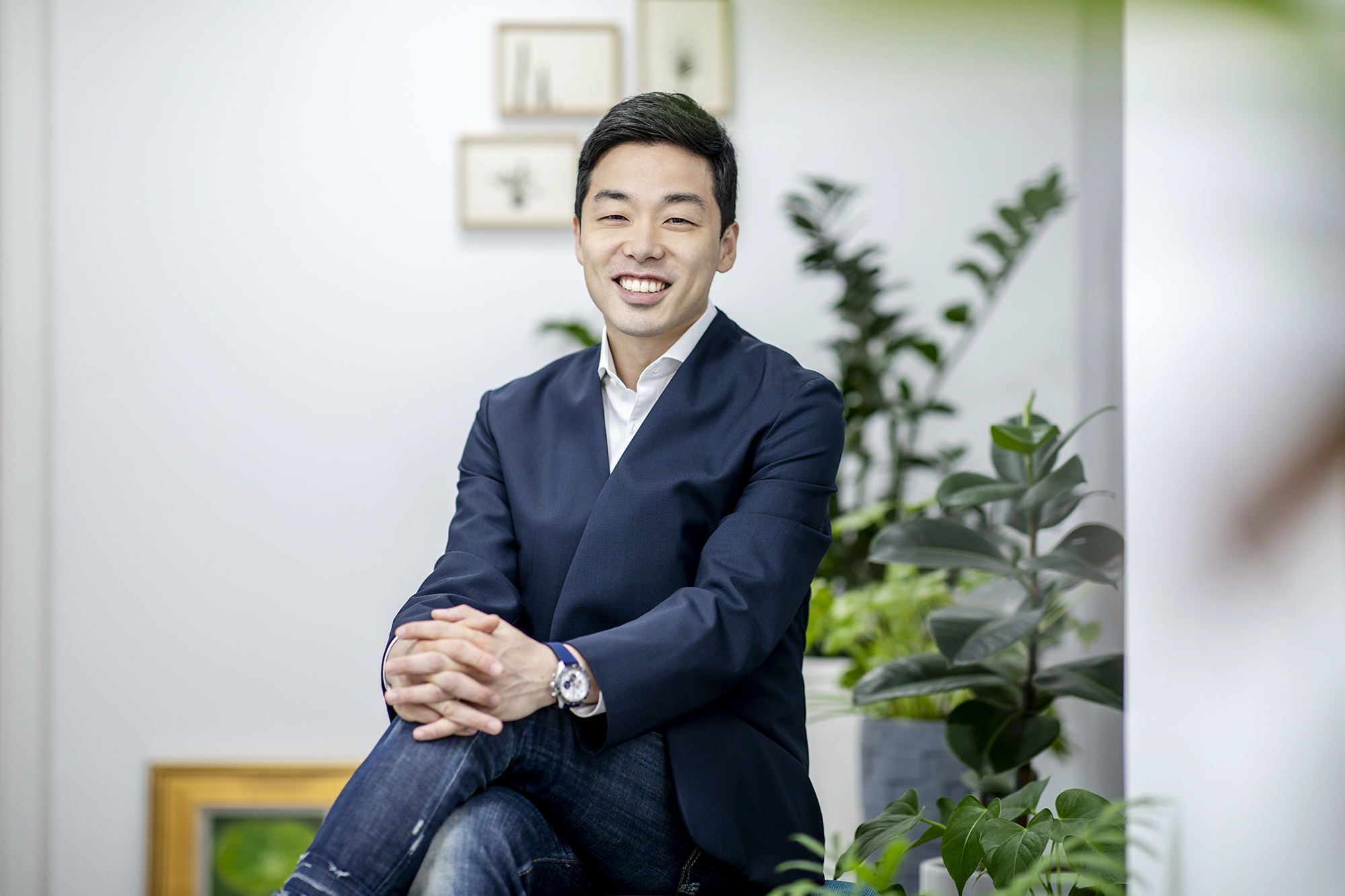- Courage to Be Treated for Those Emotionally Distressed October 26, 2021
-
Jiyong Kim (Medicine, Entering Class of '02), a Psychiatrist Fighting the Prejudice against Mental Disorders

Caught a Cold, Visit a Physician; Emotionally Hurt, Visit a Psychiatrist
Depression, anxiety, panic disorders - the names of such illnesses have become familiar for many of us. The general public's awareness of this issue of mental illness has also been on the rise through mass media, which has led to the barriers to receiving psychiatric treatment being lowered over time. However, the depth of understanding remains shallow. Despite statistics showing how common this issue can be that more than 100,000 people are showing up annually for a diagnosis, many continue to judge and misunderstand mental illnesses to be caused by an individual's lack of will or because of being overly sensitive and treat the subject like a disease that plagues our society. Psychiatric specialist Jiyong Kim is taking the lead in breaking these prejudices and stereotypes by raising awareness to have more people visit a psychiatric clinic when having a hard time and receive proper treatment, just like how they will visit an internal clinic when having a cold. With that, he has been supporting and helping out those who have mustered up their courage to make their way to his clinic with "heavy footsteps" to try and deal with the internal conflict they are suffering from.
A Time of Avoidance That Led to the Crushing of Confidence
Unlike other students from different majors, students studying medicine often have a clear path in mind since admission. Looking back, this proved to be true even for Jiyong Kim, who had been admitted into a medical school because of the recommendations from his parents rather than his own will. However, the reality he soon had to face after admission felt like a set of ill-fitting clothes. This new environment, where he surrounded himself with uninteresting lectures and clusters of students who were used to being top of their classes, became a place where he experienced endless competition and defeat. Because of this, he began to meddle with other things rather than focusing on his studies. This, of course, meant receiving poor grades and led to him receiving grade retention twice. He referred to this period of his life as "a choice of avoidance."
"Everyone has a desire to be validated. My confidence was built around the core image of myself being "the kid who was good in his studies." However, it was extremely challenging to secure a new position for me in a medical school where it was packed with students who always placed first. It was an experience of countless failures where you couldn't survive without putting in actual effort. So over time, without realizing it, I subconsciously started choosing to avoid rather than actually try. I focused on other things like basketballs and computer games, things that others told me I was good at, to maintain all that was left of my fragile sense of confidence. And it did help. That was when I completely let go of studying."
Soon, three years had passed for Kim. However, a wave of panic soon started to come over him when he had to be held back for the second time. It seemed too unnerving to choose to go down another path at this point in his life. In the end, he decided to stay at the college of medicine. However, this decision helped reduce the emotional burden in his mind as it was something he made entirely by himself. He also managed to get his academic performance back on track and graduated with grades that were slightly above average. With that, he says he "somehow" became a doctor.
Meeting a Subjective Country in the Objective World: Somehow Became a Psychiatrist
It is pretty rare to meet a psychiatrist on a daily encounter. Hence, one of the most common questions that Kim gets asked is why he decided to be a psychiatrist.
"In many departments, including internal medicine, they already have objective diagnostic tools and indicators set for us, along with fixed systems of the algorithm for drugs and treatments used to treat each symptom. It is crucial to memorize and apply them accurately during clinical practice. You could say it is almost like a multiple choice question with a fixed answer. I wasn't interested in such lectures. But the psychiatric classes were different. Not only was the process of making a diagnosis complicated, but even with the same diagnosis, the reason for the cause of an illness, symptoms, and treatment methods could be all different. There was also the charm of being able to diagnose and treat patients by having conversations instead of only prescribing them medication. It felt like I entered the only "subjective" world in the "objective" world. And I also felt like I would not grow sick of going down this path where I will always meet new people and hear their unique stories."
With that, he set off on the path of becoming a professional psychiatrist. Although he heard jokes about his department being the relatively easier one when compared to others, he still had to endure hardships while completing his major. However, with the quality education available in Yonsei, this experience proved to be worthwhile. At that time, Yonsei University was the only university in South Korea operating a professional psychiatric clinic. This was something to be very proud of, and he still regards Yonsei as the "hometown in his heart." Moreover, with the availability of patients and rare case studies, he could meet various patients and participate in treatment programs much more than any other medical college offered back then.
However, the occasional waves of skepticism washed over him during the intense course of finishing his major. In between his breathlessly busy lifestyle of working while studying, he could not help but take note of the increasing disparity between his own ideal images of his life compared to what was happening. The image of having in-depth counseling sessions that comes to mind when picturing a psychiatrist turned out to be a mere illusion contorted in the sense of fantasy. It was challenging to communicate with patients who suffered from severe symptoms and was a challenge to gain their trust. There were too many patients to treat and too much work to be done. He was growing weary from dealing with patients. Studies and other academic assignments were piling up. His main job was prescribing medication to patients rather than counseling.
"When first going through training, everyone thinks there is something different or special that sets psychiatry apart. However, there were moments when I felt rushes of confusion and skepticism where I wondered, "How is this any different from internal medicine? Did I come to this department to prescribe medication?" But it is only when you manage to overcome these moments that you finally reveal the true depths of the world. The most important thing to focus on is not amateur doctors trying to find their identities but patients' recovery. I assume my unfamiliarity with my job caused my expectations to be high. Over time, with more experience, you start to realize how important treatments using drugs are and get the idea that that should not be everything. Then you would realize that keeping this balance is the best treatment after all."
Do Not Be Quick in Making Judgments; Do Not Jump to Conclusions
Another thing he learned while meeting and treating various patients is "not to be quick in making judgments." Like how the same paragraphs and messages in a book can feel different each time you read it, many people live unimaginable lives years after treatment. Kim has an unforgettable patient. He had met that patient during the early days of learning his major. At the time of hospitalization, the patient was a college student, only 20 years old, but it was the sixth time hospitalized. The diagnosis was schizophrenia. However, the symptoms seemed to be switching between bipolar disorder and schizophrenia. Kim spent nearly two months struggling and dealing with the patient, who has now become the subject of his first case conference. During his preparation for the case conference, with the patient's history and in-depth consultation with the patient's parents, he announced that the patient should be diagnosed with bipolar disorder and not schizophrenia in many aspects.
"After this case conference, a professor known as the master of bipolar disorder who also happened to be the one to diagnose the patient with schizophrenia asked to see me privately. The professor then agreed, without hesitation, that my diagnosis might be right. Along with that, the professor also said: "Psychiatric treatment can change with time." In the end, the patient managed to be treated well, and after five years of being discharged, I received a message from the patient on social media. It was great news that the patient was studying at a prestigious university in the United Kingdom and did not have a single recurrence after discharge. Through this patient, I learned that humans are definitely capable of change. It was a case where I was taught a great lesson."
Through this experience, he once again realized that he should try not to assume anything from the client's mind as much as possible. This idea became increasingly more definite as the number of patients he counseled and treated increased. The longer you meet them, the more you find out, leading to a change in how you see things. Hence, with this realization, you start to see how the judgment you were quick to make turns out to be wrong.
Balancing a Psychiatrist's Work and Life
The most important thing to a psychiatrist is "balance." What about the mental state of a psychiatrist who always has to listen to patients' minds? Don't they get swayed by the emotions of the patients? So wouldn't it be challenging to make an objective judgment to make a diagnosis?
"A psychiatrist's office is a very secretive place. You don't know how other people carry out treatments. Therefore, it is very easy for psychiatrists to become isolated beings like in the Galápagos Islands. However, I always talk to other doctors and share my honest opinions with them. One thing I am most grateful to Yonsei for is the intensity of psychiatry training. We also have a higher number of students in psychiatry when compared to other medical schools as well. With concrete academic training systems set in place, students, over four years, develop thoroughly to emerge as individuals who fit into the image of an ideal doctor who is desired in a medical office. When talking to colleagues, seniors, and juniors about concerns about patients' treatments or psychology, we tend to bring up similar points. These things help treatments to maintain their balance. They are the greatest gifts and assets in my life."
A psychiatrist's trip back home can also sometimes be exhausting. Listening and thinking about the meanings behind each patient's depression and scars for prolonged periods require tremendous amounts of concentration. There are also times of burnout; it feels like every bit of the body has been used up, and it gets overwhelming. It's the same in any profession. Psychiatrists can't avoid it either. Then, how does a psychiatrist manage their mental health? As he tells his patients who are suffering from work-related stress, it is "protecting and maintaining a life outside of work." It is hard to keep your mind off work even after working hours with too much work-related stress. This was the same for him as well.
"Once I reached home and tried to sleep, worries such as, "Should I have prescribed more medication?" or "Should I have extended their stay at the hospital?" flooded my mind. But I started to realize this at some point in my life; they were just pointless. When you are with a patient in a clinic, you need to try your best to provide the help the patient needs. Once you are out of there, you need to be putting in your best efforts again to treat the next patient. It's about cutting your train of thought. This proved to be a huge turning point in my life."
Their Way of Fighting against Prejudice on Mental Illness
After seeing patients for many years, he was upset. He saw countless people who have just started visiting psychiatric clinics after long periods of hesitation due to the misunderstandings and prejudice they have against the place, so much that they only visit after their illnesses got worse and increasingly severe. Although they should continue taking their medication, many requested to stop their prescriptions due to the immense fear of being at a disadvantage when being employed. This was something his colleague psychiatrists had experienced often as well. In 2017, together with his colleagues, Kim started a podcast called BrainRich, where they shared their anger and laments about such a reality.
"We all didn't want just to keep lamenting. With our repeated feelings of sadness and frustration piling up high, we finally realized that fears and prejudice against mental illnesses were created due to "the lack of knowledge." No one had talked about these things, so it was natural to be unknown. We believed delivering accurate, and easy-to-comprehend information about mental illness would help reduce the number of people unaware of this issue and effectively resolve the misunderstanding and prejudice in our society."
The podcast turned out to be quite a challenge. After their sessions, they took some time out of their busy schedules to think about topics, write their scripts, and record them. At first, they had doubts about people listening to their podcast, but the response from the public was beyond their expectations. The number of their subscribers was on the rise, and finally, within a month, they had ranked second on the overall chart on iTunes.
"We are guessing that this explosive response is because the barriers of entry to psychiatrist's offices were much higher than what we have imagined? Everything we have heard and seen so far all took place within the clinic's walls, and through BrainRich, we could listen to stories from outside of our clinics. There were still so many who were suffering mentally as they could not bring themselves to cross these barriers. We received so much love that we were selected as one of the top 20 well-loved podcasts in 2019. We believe we are continually receiving such overwhelming support because the barriers of entry to psychiatrist's offices are still very high."
Compared to years ago, prejudice and misunderstanding about psychiatric treatment have collapsed a lot, and awareness of the need has also increased. He also feels rewarded that he has made a small contribution to such a change. Still, some people seek exorcism instead of psychiatric treatment or have only excessive fear instead of believing in the effects of medication. As such, Jiyong Kim plans on continuing to tell these stories just like he has always been.
"Recently, professional psychiatrists like Dr. Oh Eun-Young have been receiving a lot of attention from the public. But the stories she talks about are not unfamiliar to the field of psychiatry. I think the reason behind her influence is that she has been making an effort to talk to the public for a long time, and her sincerity has finally reached them. Our stories went unheard for decades because nobody had any knowledge of psychiatry. In fact, despite us calling it popular, there will probably be more of you who have not heard of BrainRich before. Therefore, before we start worrying about the next stage of our lives, we decided to continue sharing and talking about stories of our strengths first."
Age of Anxiety and Focusing on the Present
His latest book, Somehow a Psychiatrist, is filled with stories that share honest and realistic tales of being a psychiatrist. Rather than trying to educate others, he confesses how psychiatrists face despair and lose direction in their lives just like everyone else. Still, because they learned how to deal with such moments, they can use this knowledge to play the role of a supporter who can walk with those struggling to find a direction in their lives. He also shared his personal experiences and feelings about his life.
What surprised him after publishing the book was that students who dreamt of being psychiatrists or students who planned on majoring in psychiatry were sending him letters, and some even visited him. His story was something that they needed and could act as a guide for them. He decided to publish a book despite being extremely busy with the podcast, YouTube, and lectures because each type of media appealed to different kinds of audiences. To this day, he continues to put his best effort into everything he does in the hopes of people having better and correct perceptions of psychiatric treatments. Anyone dealing with an internal struggle will be able to make their way to a psychiatric clinic easily. Sometimes he attends events that are meant for his juniors. This is because he is living a different lifestyle from a typical doctor.
"Last summer, Professor Min Geol Lee of dermatology contacted me. As I was living a different life from many other clinical doctors, he invited me to share my stories with his students. I felt so proud and accomplished. When I went there, I talked about the days I spent emotionally wandering after being admitted into medical college. I wanted to talk about how every medical student, at least once, will come across a point in their lives where they can get caught up by a sudden plunge in their level of self-esteem. However, this is not what life is all about, and they have many other abilities apart from receiving good grades. I wanted to tell them that they are much better than how they view themselves."
This also happens to be the message he wishes to tell more young people today. Most people who make their way to his clinic have graduated from prestigious universities and are employed in major companies. They are some of the hardest-working people, but they suffer from endless anxiety. They sacrifice all hours of today to the fears of the unknown future. Many who graduated from prestigious universities suffer from anxiety, thinking they will be reduced to nothing without their titles. To them, Jiyong Kim offers a warm assurance.
"The title of being a student in a prestigious university was not gifted to you by someone. It is something you have achieved by yourself. You should learn to praise and encourage yourself more. Having a high sense of self-worth will allow you to take on various challenges. I hope you will continue seeking new opportunities with confidence and not let yourself be trapped in a narrow world."
I May Not Be Perfect, but I Am Enough
Everyone seems to be clinging to their self-esteem. This is because we are experiencing an era of anxiety. Anxiety constantly makes us feel worried, and we can never feel relieved. To this, Jiyong Kim says that to find self-esteem indeed, we should not let education, grades, or whether we work in major companies and such become measurements of our success. Instead, we should learn to respect other types of values. He recommends finding the answer in this sentence: "You are enough as you are." And during this process of transformation, he is also aware that as a psychiatrist, he needs to take on more roles and responsibilities. Therefore, while continuing to raise awareness about psychiatry through various activities, he constantly reminds himself of his duties as a doctor and promises to do his best.
"Carrying out various activities can often be a double-edged sword. Many have high expectations walking into our clinic. Sometimes I end up disappointing them as much as they have looked forward to visiting us, but it is my job to be that doctor who puts in their best effort in treating the patient before me. That is why I don't accept appointments where the patient has to wait for over a month. There is no reason why my abilities in treating patients would be far superior to other doctors, so they should go to a different clinic and receive treatment quickly rather than wait six months."
Yonsei Alumnus Jiyong Kim says that it takes great "courage" to come to a psychiatric clinic and receive counseling treatment. This is because instead of going down the easy route and blaming others, choosing to question their minds and the others and wanting to change for the better is a much more difficult decision to make. Being aware of this more than anyone else, Kim always tells himself that he will do his best "now, at this moment," as he faces his patients in the clinic. His goal is to be a doctor, who, despite not being perfect, is pretty good at what he does. He aims to continue venturing down this path of being a "doctor with a score of 70" without being wielded around by extreme expectations. Although Kim somehow became a psychiatrist, he is grateful his job gives him the "privilege of looking into the minds" of his patients who managed to overcome the barrier of a psychiatric hospital; to help them seek the answers they are looking for.
show mobile menu
mobile menu




